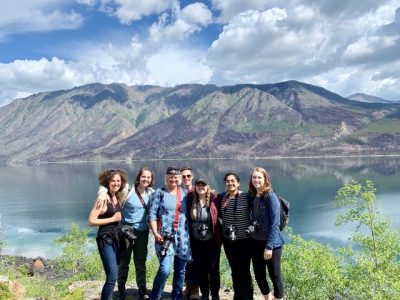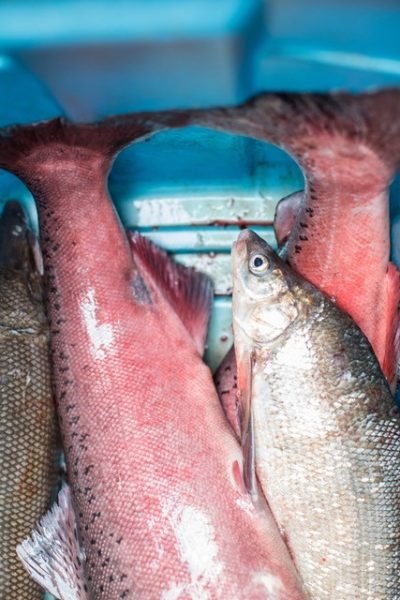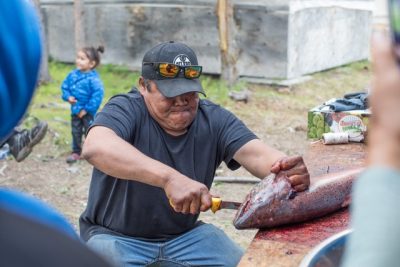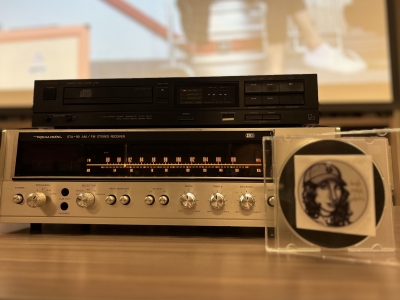By Jena Lynde-Smith
Something as simple as a summer fish camp can mean so much more.
This is what journalism student Meral Jamal learned during her visit to a salmon fish camp in Old Crow, the Yukon’s northernmost Indigenous community. The feature story she wrote about her experience recently won her first place in this year’s Guelph-Humber Emerge Media Awards, which received a total of 300 submissions.
“I am pretty surprised,” she said. “When I wrote this story, it was a labour of love… I didn’t quite expect to win anything.”
Jamal travelled to the Yukon for five weeks in 2019 as part of Stories North, an experiential learning initiative founded by associate professor Kanina Holmes. The program brings Carleton journalism students to the northern territory for immersive and collaborative storytelling.

Meral Jamal, Kanina Holmes and 5 other students in the Yukon for Stories North.
Holmes, Jamal and six other students spent 10 days of the trip in Old Crow. On their first day there, they got invited to visit the community’s family salmon fish and culture camp. It is run by the Vuntut Gwitchin government and this was its first year in operation.
The site was created as a children’s summer camp but Jamal said that it means so much more than that. She said that the camp is a way for the people of Old Crow to share their salmon fishing traditions with their youth, connect children with the elders in the community, and to help with mental health by being out in nature and learning off the land.

“It’s about more than just spending your summer in a good way and spending time together, but it’s coming together for the sharing of traditions and culture,” she said. “I was lucky that I got to be a part of that.”
Jamal had just finished her second year of her journalism program when she made the trip to the Yukon. She said that as an international student, she felt she had a duty to report on Canada’s Indigenous population.
“Being an international student and being in Canada, it becomes my responsibility as an outsider to be able to use journalism as a tool to share the stories of people who have given me the opportunity to be here,” she said.
When asked about what she learned through her Stories North experience, Jamal offered a piece of advice for her journalism colleagues.
“The biggest thing I learned from the entire experience was to report with communities instead of on them.
“As the journalism world evolves and journalism training evolves for students, it becomes important for us to communicate with them, seek permission and share the stories that they are comfortable with us sharing. Spending time listening to them, learning from them and recognizing what is important to them,” she said.

Inspired by her time in Old Crow, she said she plans to continue covering Indigenous stories.
“Having more stories come out of there, having more stories come from Indigenous communities – will help us understand them better and help us build better relationships with them in the future,” she said.
Jamal said she is humbled by winning first in the EMAs and she hopes that this is an opportunity for people to not just read her story but to read the stories submitted by all of those who participated.
“In every class that I’ve been in at Carleton, they supported student journalism so much. I just hope that this is an opportunity for people outside journalism school, people who aren’t student journalists themselves, to support student journalism,” she said.
Read the finalist submissions for this year’s EMAs here.
Monday, April 20, 2020 in General, Journalism News
Share: Twitter, Facebook



